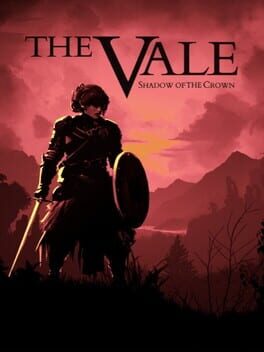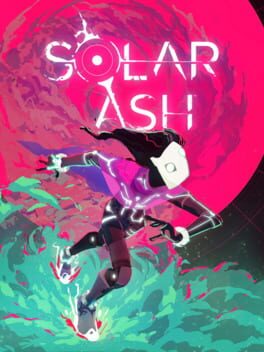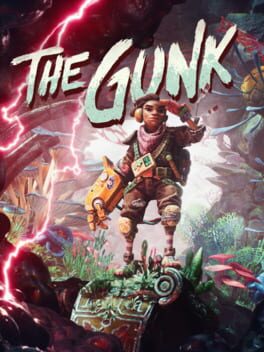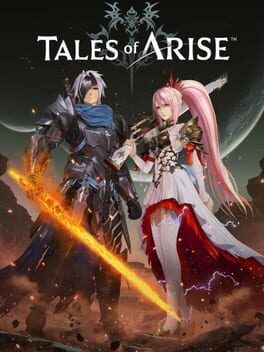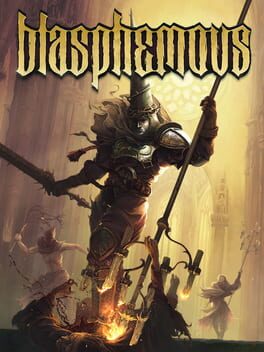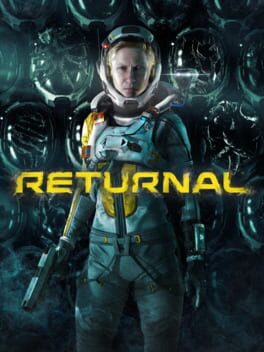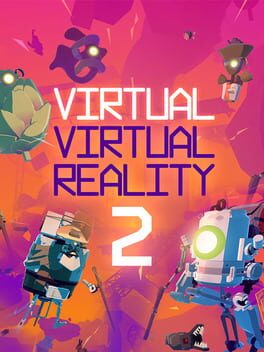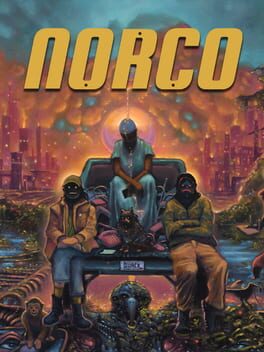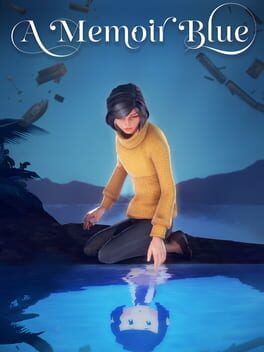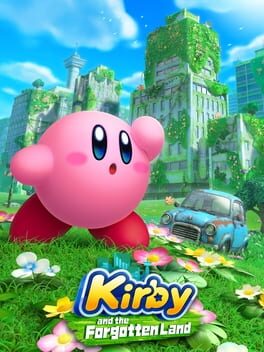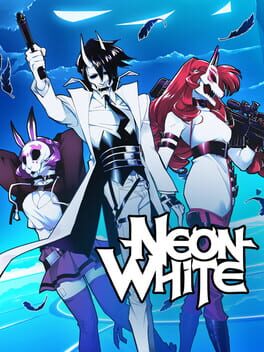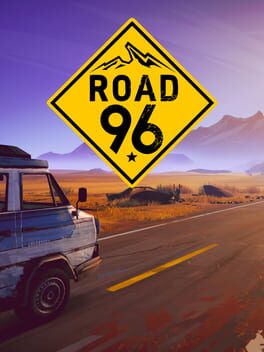2021
This was a rollercoaster ride for me of being completely in and out of where the game was taking me. There were definite disappointments and downturns regarding onslaughts of new mechanics and the meta story that got me really close to dropping the game, but ultimately I am glad to have seen it through, even if I wish that this was the moody horror card-game/escape room hybrid it is on the box, because these are definitely the best bits of the experience. It has some tricks up its sleeve that still turned it around for me in the end and if you haven't experienced any other game from the developer you will probably quite enjoy the surprises the game has in store for you. If you know what direction I am hinting at a lot won't be as effective anymore, but it is definitely more refined in what it does than many other similar games. If you are at all intrigued by this game, absolutely try it, if nothing else it absolutely entertains in every minute.
2021
It is a weird sensation to play a game with your eyes closed. The concept doesn't work perfectly, overlapping sounds are a problem when trying to discern the direction of attacks and the scope obviously had to be limited and adjusted to not just have thousands of RPG menues that need to be read out one by one. As a whole it works surprisingly well, though. The immersion achieved by just relying on your hearing in detailed soundscapes is pretty impressive. And while the story and world are standard medieval fantasy, the characters really shine through good writing and emotional performances. I really liked the concise side quest structure, offering self contained vignettes that get straight to the point and can offer variety in setting more easily due to the lack of visuals needed to build unique spaces. Another surprise was the combat system, which has an unexpected depth to it, adding new mechanics constantly throughout the 6 hour experience, while still remaining accessible and simple. This is an interesting counterpart to Before Your Eyes this year and I recommend checking this out just for the novelty of the interaction, it is definitely worth it.
2021
What a banger. This feels like a blockbuster Metroid game, which sounds weird considering its traditional 2D nature. The perspective is the only thing traditional about this game, though. The controls are buttery smooth, the use of 3D in cinematics and general gameplay adds massive value in cinematography and visual flourishes. This feels like a truly modern Metroid game that finds its place neatly in a genre that has grown many entries surpassing its origins. The cinematic focus and streamlined gameplay suffer one minor casualty, though. The exploration. Metroid Dread is a weirdly linear game that wants you to believe that it is totally open. Once you gain new abilities you obviously want to explore previous areas to make use of them, which almost never works out due to newly placed artificial boundaries like temperature changes, random physical blockades or totally sectioned off areas only accessible from one direction. I was waiting for a fast travel system or something similar to have this issue remedied after finally having some major upgrades, but it never came just like the drive to explore old areas quickly died off because the game clearly wanted to funnel me into a linear experience that still takes you back and forth across all areas, just not on your own terms, which stings a bit. The game makes up for it, though, if you let it and embrace the kind of game it is, which is why I still hold this game in the highest regards. It isn't the best metroidvania, but it might be the best (at least 2D) Metroid.
2021
This is definitely carried by an innate pleasure derived from the movement in this game and the stellar audio-visual experience, offering beautiful set pieces and surprisingly varied environments to skate through. What drags this game down though is first, an extremely shallow mechanical depth, offering the same experience throughout the game from the first minute. There are aspects of mastery, but not to a degree that reached a meaningful enhancement of the experience. I wish they leaned into the momentum of the movement way more heavily, allowing for emergent gameplay to happen where it already naturally feels like it could be there, just bubbling under the surface. The main collectibles in this are one of the weirdest systems I have ever seen in a game. It is a generic red substance in form of blobs or crystals found all over the place. It has one use: To upgrade your health bar. The problem: You can easily upgrade your health bar to the maximum before even fighting the first boss, after which you will lose one health upgrade, which you can just as easily rebuy again without any meaningful engagement or choice happening in the process. Either go all in: Remove all health upgrades at a boss and make it really useful to have them for the fights creating a decision for the player or just offer any kind of alternative, be it cosmetics. The current system adds to the overall feeling of the gameplay and systems not fully supporting the vision of the visuals, sound and story. I still immensely enjoyed my experience with Solar Ash, though and loved finding all the secret stashes and just being in this world.
2021
The Gunk is pretty enjoyable for what it is, even if what it is is nothing too flashy. The game feels pretty good to roam around in, even if the core mechanics run out of steam pretty quickly. The removal of the titular gunk feels decently satisfying the first few times, but then gets tedious and borderline painful to squeeze the triggers for extended periods of time.
The Gunk feels fallen out of the PS2 or even PS3/360 era where there were tons of 3D adventure games that got lost in the shuffle but resonate with people that decided to give them a chance, maybe as one of their first games growing up or due to an appealing cover artwork. I have a soft spot for these kinds of games and grew up playing them, so I can't help but feel fondness for what The Gunk ended up being. It is small, it is unambitious, but at the same time there is something precious to it.
The music is one aspect that definitely stands out as really good and so does the environment art with the transitions from corrupted to lush floral meadows and interesting overgrown ruins. It is nothing you haven't seen before, but will no doubt resonate with people in the right spot for it in their lives. The perfect Game Pass game in that sense and I hope this will be someones first adventure game that they will too have fond memories for in the future while nobody around them will have heard of it.
The Gunk feels fallen out of the PS2 or even PS3/360 era where there were tons of 3D adventure games that got lost in the shuffle but resonate with people that decided to give them a chance, maybe as one of their first games growing up or due to an appealing cover artwork. I have a soft spot for these kinds of games and grew up playing them, so I can't help but feel fondness for what The Gunk ended up being. It is small, it is unambitious, but at the same time there is something precious to it.
The music is one aspect that definitely stands out as really good and so does the environment art with the transitions from corrupted to lush floral meadows and interesting overgrown ruins. It is nothing you haven't seen before, but will no doubt resonate with people in the right spot for it in their lives. The perfect Game Pass game in that sense and I hope this will be someones first adventure game that they will too have fond memories for in the future while nobody around them will have heard of it.
2021
Tales of Arise is a complete JRPG package polished from start to finish unlike many others. The battle system is carried by incredibly varied and fluid animations and playstyles while being hindered by finicky menu management of loadouts of your AI companions, the story is interesting throughout even if it played it a bit too safe in the end and the characters are lovable and have great dynamics... Okay this out of the way, I wanted to talk about something weirdly specific that stood out to me about this game:
The economy of ressources and rewards is amazing. On Normal difficulty I always felt like I was just scraping by in terms of money, right until the point where I was mentally getting ready to wrap up, at which point the tight grip loosened, which was remarkable to me and felt perfectly balanced.
Another aspect of that are the skill points. So you unlock a lot of small skill trees by doing side quests, achieving certain milestones with a character or progressing the main story, but by default regular fights really don't give you that many points to invest. This is where side quests come in, which almost always have a hefty skill point reward in addition to other rewards, which made them absolutely addictive to me, since you could essentially choose your reward and the balance being such that it always felt great to be able to finally afford a new attack or stat bonus or complete a skill tree for the completion bonus. Even when mostly clearing out all the side quests in the game available in the first playthrough I still didn't finish all the skill trees but ended up at a point where I was satisfied with my characters. All that with barely any grinding required. That is honestly an incredible feat and something to be studied for its game design balance and a hook that drew me deeper into the systems of Arise. And this is not even mentioning other rewards like recipes or cosmetics, which I also really enjoyed.
Tales of Arise was my first Tales game as you could probably tell if any of the systems I described are series staples refined over decades, but this game certainly made a great impression and while other entries in the franchise never looked appealing to me, I am definitely keeping an eye out on the future of the series.
The economy of ressources and rewards is amazing. On Normal difficulty I always felt like I was just scraping by in terms of money, right until the point where I was mentally getting ready to wrap up, at which point the tight grip loosened, which was remarkable to me and felt perfectly balanced.
Another aspect of that are the skill points. So you unlock a lot of small skill trees by doing side quests, achieving certain milestones with a character or progressing the main story, but by default regular fights really don't give you that many points to invest. This is where side quests come in, which almost always have a hefty skill point reward in addition to other rewards, which made them absolutely addictive to me, since you could essentially choose your reward and the balance being such that it always felt great to be able to finally afford a new attack or stat bonus or complete a skill tree for the completion bonus. Even when mostly clearing out all the side quests in the game available in the first playthrough I still didn't finish all the skill trees but ended up at a point where I was satisfied with my characters. All that with barely any grinding required. That is honestly an incredible feat and something to be studied for its game design balance and a hook that drew me deeper into the systems of Arise. And this is not even mentioning other rewards like recipes or cosmetics, which I also really enjoyed.
Tales of Arise was my first Tales game as you could probably tell if any of the systems I described are series staples refined over decades, but this game certainly made a great impression and while other entries in the franchise never looked appealing to me, I am definitely keeping an eye out on the future of the series.
2019
I would lie if I said that I could follow any of the lore in this game even in the slightest, it went way over my head. Still, I can absolutely appreciate the worldbuilding achieved and admire the depth and consistency present in every aspect of the storytelling, even if it isn't the most digestible narrative. It certainly feels fresh in the mythology and cultural background used, even if the tone and gruesome nature mirrored in the gameplay is familiar in the genre.
What drove me to almost 100% this game is a really tight gameplay loop where most collectibles serve an in world purpose and are hidden at a perfectly balanced rate, where you actually feel like you can totally collect everything without investing dozens of extra hours searching every corner. This is also helped by a strong map that removes frustration by showing you when a room is or isn't a dead end if you pay attention.
The boss fights are definite highlights, offering creative mechanics and making the fights clearly accessible to master with the moves available to you, avoiding big frustration points often present in these tough Souls-likes. As tight as the combat is, the platforming didn't work that smoothly too often, unfortunately, even if the added speedrun challenges were extremely fun to master once accepting the quirks of the platforming.
In general, there has been a lot of work being done on the game in the form of free updates since release. Since this was my first time playing, I can't speak to the differences, but I really enjoy how they implemented the new content into the base game, where I didn't know something was added until looking it up specifically, which makes Blasphemous at this point a really nice package and one of the better metroidvanias out there.
What drove me to almost 100% this game is a really tight gameplay loop where most collectibles serve an in world purpose and are hidden at a perfectly balanced rate, where you actually feel like you can totally collect everything without investing dozens of extra hours searching every corner. This is also helped by a strong map that removes frustration by showing you when a room is or isn't a dead end if you pay attention.
The boss fights are definite highlights, offering creative mechanics and making the fights clearly accessible to master with the moves available to you, avoiding big frustration points often present in these tough Souls-likes. As tight as the combat is, the platforming didn't work that smoothly too often, unfortunately, even if the added speedrun challenges were extremely fun to master once accepting the quirks of the platforming.
In general, there has been a lot of work being done on the game in the form of free updates since release. Since this was my first time playing, I can't speak to the differences, but I really enjoy how they implemented the new content into the base game, where I didn't know something was added until looking it up specifically, which makes Blasphemous at this point a really nice package and one of the better metroidvanias out there.
2021
This game broke me. I rarely play games, and especially not AAA games, where I am genuinely unsure whether I can finish them. Returnal had multiple of these moments where hour long intense runs would come crashing down in an instant of brutal punishment and were it not for the incredible game feel and atmosphere I would have quickly abandoned it many times over.
But I didn't. In the end it was quite an anticlimactic final stretch where certain lucky perks meant that I was essentially invincible, rolling through the last two biomes and final boss after struggling for days on end beforehand to even make any progress. This inconsistency of experience is certainly an issue that frustrated me, cursing at the screen after being stuck with a run-killing malfunction (a risk system tied to certain items and chests where you can get a random penalty ranging from mildly inconvenient to disastrous, the removal of them being tied to equally random challenges, ranging similarly from easily doable to completely out of your control) or losing to a random enemy after not finding any health pickups in three rooms.
The intense difficulty combined with insanely long runs also heavily discourages experimentation, which is a shame because the weapon system allows you to unlock certain perks for weapons you use, heavily modifying the feel of a weapon. In the later runs this meant for me that I would always use my faithful carbine with four unlocked perks instead of trying my hand at a new weapon where I still have to unlock perks one by one. The randomized distribution of weapons of course means you won't always get the weapon you want, which lead in turn to cool moments of unlocking a perk like Full Auto on the rocket launcher, which wasn't a weapon I favored at all now becoming an absolute killing machine, completely altering the weapon. I just wish there was maybe an option to choose your starting weapon, encouraging experimentation at least a little bit more.
In conclusion, this is a fantastic game with extremely rough edges that fully envelops all of its mechanics and interactions in its haunting atmosphere and world building, surely to be appreciated even years from now.
But I didn't. In the end it was quite an anticlimactic final stretch where certain lucky perks meant that I was essentially invincible, rolling through the last two biomes and final boss after struggling for days on end beforehand to even make any progress. This inconsistency of experience is certainly an issue that frustrated me, cursing at the screen after being stuck with a run-killing malfunction (a risk system tied to certain items and chests where you can get a random penalty ranging from mildly inconvenient to disastrous, the removal of them being tied to equally random challenges, ranging similarly from easily doable to completely out of your control) or losing to a random enemy after not finding any health pickups in three rooms.
The intense difficulty combined with insanely long runs also heavily discourages experimentation, which is a shame because the weapon system allows you to unlock certain perks for weapons you use, heavily modifying the feel of a weapon. In the later runs this meant for me that I would always use my faithful carbine with four unlocked perks instead of trying my hand at a new weapon where I still have to unlock perks one by one. The randomized distribution of weapons of course means you won't always get the weapon you want, which lead in turn to cool moments of unlocking a perk like Full Auto on the rocket launcher, which wasn't a weapon I favored at all now becoming an absolute killing machine, completely altering the weapon. I just wish there was maybe an option to choose your starting weapon, encouraging experimentation at least a little bit more.
In conclusion, this is a fantastic game with extremely rough edges that fully envelops all of its mechanics and interactions in its haunting atmosphere and world building, surely to be appreciated even years from now.
This was borderline unplayable for me at the time of writing. Tender Claws has banked maximum good will with the first one and especially The Under Presents, so I will wait out some patches and return to it when it is hopefully more stable in terms of glitches and bugs, because what little I played of it definitely had potential.
2022
Norco absolutely rules. One of the best written games I have ever played, feauturing a gorgeously realized and mesmerizing setting so confident in every step that you can't help but be sucked into the fever dream it is presenting. I stopped playing the demo after 10 minutes because I knew immediately that this would be amazing and I am glad I was right. Feels right at home next to a Kentucky Route Zero and Disco Elysium, which completes an interesting trifecta of games to recommend if you have played any one of these.
2022
A Memoir Blue is an absolutely gorgeous game that is brave enough to tell exactly the story it wants to tell and nothing more in the hour it will take you to finish this. Unfortunately, the story it tells (or rather shows, as this game plays out entirely without words) is rather shallow and toothless and the audio-visual presentation does the heavy lifting to make this an absolutely worthwhile package in the end anyway.
2022
What looks like a nostalgia-driven Zelda clone on the surface turns out be so much more than that or rather invokes the nostalgia in more creative ways than you would expect. It calls back on the era of extensive game manuals and obtuse game mechanics and channels the experience of playing imported games in languages you don't understand, which is such a specific but untapped experience that is wonderfully translated into a fully formed puzzle-adventure. It is to many parts a player knowledge based puzzle box of figuring out the possibility space and (mechanical) language of the game more often than not feeling closer to an Outer Wilds, The Witness or Fez than its more obvious surface level Zelda or Dark Souls inspirations.
It isn't perfect, though. Hiding all the basic elements of your game and putting tutorials behind obscure scribbles on manual pages leads to many magical revelations but can easily in turn leave you stumped at what to do or how to interpret something when you don't know what the full possibility space of the game is yet. The more traditional meat of the game, mainly the combat never truly felt as responsive or fun as I wanted and there is an overall clunkyness in interactions with the world through weird perspective issues caused by the isometric camera, annoying inventory management and floaty combat. Nevertheless I would probably universally recommend this game to anyone even remotely interested. The in-game manual and related puzzle mechanics are such cool systems and breath of fresh air that absolutely need to be experienced. Even if you don't have nostalgia for this era of games and the surrounding games culture of reading manuals and importing japanese games, Tunic will make sure that you wish that you experienced that era.
It isn't perfect, though. Hiding all the basic elements of your game and putting tutorials behind obscure scribbles on manual pages leads to many magical revelations but can easily in turn leave you stumped at what to do or how to interpret something when you don't know what the full possibility space of the game is yet. The more traditional meat of the game, mainly the combat never truly felt as responsive or fun as I wanted and there is an overall clunkyness in interactions with the world through weird perspective issues caused by the isometric camera, annoying inventory management and floaty combat. Nevertheless I would probably universally recommend this game to anyone even remotely interested. The in-game manual and related puzzle mechanics are such cool systems and breath of fresh air that absolutely need to be experienced. Even if you don't have nostalgia for this era of games and the surrounding games culture of reading manuals and importing japanese games, Tunic will make sure that you wish that you experienced that era.
This game is so weirdly good. The setting is an absolute star here, feeling so totally opposed but also perfectly natural to the cutesy Kirby presentation and doing a lot of heavy lifting in pushing and pulling this game into a unique and fresh direction. The combat is unexpectedly nuanced with decently deep mechanics on many of the available forms and a fantastic upgrade system turns these abilities into fascinating variations. An ability fusion system like in Kirby 64 would have probably cemented this into a masterpiece for me, though. Maybe next time. Still, this was an absolutely delightful time and I really hope this is a stepping stone for the future of Kirby.
2022
The defining achievement of Neon White seems to be turning people with no speedrunning or highscore-chasing ambitions around to do just that. That's certainly the case with me.
I didn't chase for the global leaderboards, shaving off milliseconds, but I made it a mission to get every Ace medal and collectible in every level, because doing that is less of a challenge to perfectly take each corner but instead distinct puzzle solving of how to use the tools available to you to get to a seemingly unreachable spot or solve the alternative path that is highlighted in the built-in hint system.
The reason why I was striving for the completion of every challenge is the excellent game feel and fantastic soundtrack, effortlessly putting you into a flow state within seconds. You also quickly learn that you can rely on the game being fair to you, gradually increasing the intensity but never forcing you to beat your head against a wall or requiring pixel perfect precision.
The writing I unfortunately didn't care for at all, it is -very much- woven out of internet culture, memes and tropes and while it combined with the voice acting probably evokes a semi ironic nostalgia for beloved english anime dubs, it certainly failed to make me care for the characters at all and the little vignettes that you unlock by collecting gifts in the levels felt hollow and pointless for the most part unfortunately.
This would normally be a bigger deal breaker for me than it actually ended up being, just because of the strength of all the surrounding elements. It is just so unbelievably fun and I can't help but love Neon White in its entirety because of that.
I didn't chase for the global leaderboards, shaving off milliseconds, but I made it a mission to get every Ace medal and collectible in every level, because doing that is less of a challenge to perfectly take each corner but instead distinct puzzle solving of how to use the tools available to you to get to a seemingly unreachable spot or solve the alternative path that is highlighted in the built-in hint system.
The reason why I was striving for the completion of every challenge is the excellent game feel and fantastic soundtrack, effortlessly putting you into a flow state within seconds. You also quickly learn that you can rely on the game being fair to you, gradually increasing the intensity but never forcing you to beat your head against a wall or requiring pixel perfect precision.
The writing I unfortunately didn't care for at all, it is -very much- woven out of internet culture, memes and tropes and while it combined with the voice acting probably evokes a semi ironic nostalgia for beloved english anime dubs, it certainly failed to make me care for the characters at all and the little vignettes that you unlock by collecting gifts in the levels felt hollow and pointless for the most part unfortunately.
This would normally be a bigger deal breaker for me than it actually ended up being, just because of the strength of all the surrounding elements. It is just so unbelievably fun and I can't help but love Neon White in its entirety because of that.
2021
Man, this game is so interesting and I am really glad I finally decided to play it on a whim without really knowing what it was about.
The narrative structure is fascinating and generally works incredibly well with the story it tells, stitching together roadtrips with vignettes featuring a distinct cast of characters. These vignettes offer great variety in settings and tones and the narrative puzzle revealed bit by bit through these character moments is genuinely interesting to follow because you never know for sure what you will get with each new vignette. I really can't say enough nice things about the narrative design, structure and gameplay loop of Road 96.
So... why this score?
Well, I didn't talk about the actual contents of the game yet. Road 96 is unabashedly political through every fiber of its narrative. And therein lies the problem. I adore games willing to take on politics and having the guts to stand for something.
The politics of Road 96 are messy and not supported or conveyed by the most amazing writing I have seen around, to be generous. The chosen characters and their roles in the world are certainly diverse and interesting, but it often dips into territories you wouldn't go with as the player, lacking the meaningful application of player agency and the hamfisted parallels to the real world are played for laughs and irony for the most part but can't help but reveal the superficial depth we can expect from its handling of politics. The performances are emotional for sure in key moments, but also really do not stand out as anything but servicable for the most part.
The main issue I had around the narrative problems was the lack of reactivity or guidance from characters and the game on what my decisions mean. Disappointing a staunch anarchist by choosing the moderate dialogue option got me a disappointed one-liner but...okay? There are generally three options you get, 1. everyone for themselves, 2. fuck the system 3. go vote pwease, which seem to accumulate in the background for something...maybe? I am not sure if there are even any consequences to these flavor choices you make, maybe it's so seamless that I didn't notice, but in any case there is just this total lack of bite and reaction to every choice because of this, leaving the player in this ambigous space where they just play along until credits roll.
Maybe, that's just me. It is still absolutely worth it to play this game, I can't emphasize this enough, Road 96 fascinates me to no end and it has a lot going for it, if you are at all on the fence about it, I will absolutely recommend it, at the very least you will find a lot to like, maybe even dismissing my criticisms, in which case this game could be loved by a lot of people, I believe.
The narrative structure is fascinating and generally works incredibly well with the story it tells, stitching together roadtrips with vignettes featuring a distinct cast of characters. These vignettes offer great variety in settings and tones and the narrative puzzle revealed bit by bit through these character moments is genuinely interesting to follow because you never know for sure what you will get with each new vignette. I really can't say enough nice things about the narrative design, structure and gameplay loop of Road 96.
So... why this score?
Well, I didn't talk about the actual contents of the game yet. Road 96 is unabashedly political through every fiber of its narrative. And therein lies the problem. I adore games willing to take on politics and having the guts to stand for something.
The politics of Road 96 are messy and not supported or conveyed by the most amazing writing I have seen around, to be generous. The chosen characters and their roles in the world are certainly diverse and interesting, but it often dips into territories you wouldn't go with as the player, lacking the meaningful application of player agency and the hamfisted parallels to the real world are played for laughs and irony for the most part but can't help but reveal the superficial depth we can expect from its handling of politics. The performances are emotional for sure in key moments, but also really do not stand out as anything but servicable for the most part.
The main issue I had around the narrative problems was the lack of reactivity or guidance from characters and the game on what my decisions mean. Disappointing a staunch anarchist by choosing the moderate dialogue option got me a disappointed one-liner but...okay? There are generally three options you get, 1. everyone for themselves, 2. fuck the system 3. go vote pwease, which seem to accumulate in the background for something...maybe? I am not sure if there are even any consequences to these flavor choices you make, maybe it's so seamless that I didn't notice, but in any case there is just this total lack of bite and reaction to every choice because of this, leaving the player in this ambigous space where they just play along until credits roll.
Maybe, that's just me. It is still absolutely worth it to play this game, I can't emphasize this enough, Road 96 fascinates me to no end and it has a lot going for it, if you are at all on the fence about it, I will absolutely recommend it, at the very least you will find a lot to like, maybe even dismissing my criticisms, in which case this game could be loved by a lot of people, I believe.

